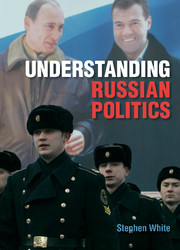Book contents
- Frontmatter
- Contents
- List of figures
- List of tables
- Preface
- Map: administrative units under the 1993 Constitution
- 1 From communist to postcommunist rule
- 2 Voters, parties and parliament
- 3 Presidential government
- 4 From plan to market
- 5 A divided society
- 6 Changing times, changing values
- 7 Russia and the wider world
- 8 What kind of system?
- Notes
- A Note on surveys
- Index
- References
2 - Voters, parties and parliament
Published online by Cambridge University Press: 05 June 2012
- Frontmatter
- Contents
- List of figures
- List of tables
- Preface
- Map: administrative units under the 1993 Constitution
- 1 From communist to postcommunist rule
- 2 Voters, parties and parliament
- 3 Presidential government
- 4 From plan to market
- 5 A divided society
- 6 Changing times, changing values
- 7 Russia and the wider world
- 8 What kind of system?
- Notes
- A Note on surveys
- Index
- References
Summary
The new Russian Federation, under the Constitution it adopted in December 1993, was to be a ‘democratic federal law-based state with a republican form of government’. What kind of form of government this might be took some time to establish, but from the outset it was a state in which the right to rule was based on regular elections to a new parliament, whose lower house was called the State Duma.
Parties, however, remained very weak, elections were increasingly controlled by the authorities themselves, and under Vladimir Putin, from 2000 onwards, the Kremlin itself became the dominant player, acting through a ‘party of power’ that it had itself established and subordinating the country as a whole to a top-down ‘executive vertical’. Law-making authority, formally speaking, was still in the hands of the State Duma, but the Kremlin controlled the party that held two-thirds of its seats, and the more political power was centralised, the more the parliament became a marginal participant in the policy process.
Voting was still quite new in early postcommunist Russia. Voting, that was, in the sense of choosing. Under the Soviet system there had been elections at regular intervals but no opportunity to select, not just among candidates and parties but (in practice) whether to vote at all. In a variation on Brecht's suggestion that the government ‘elect a new people’, it was the leadership that determined the composition of each new parliament and the constituencies in which they would themselves be nominated.
- Type
- Chapter
- Information
- Understanding Russian Politics , pp. 27 - 70Publisher: Cambridge University PressPrint publication year: 2011



